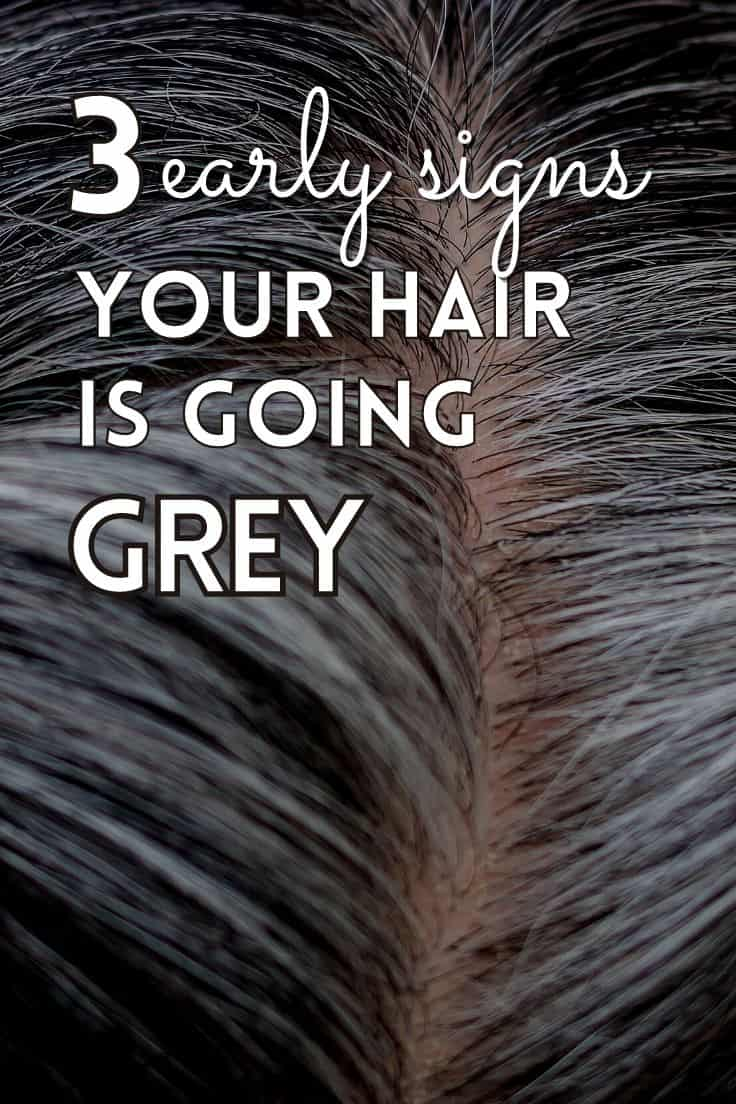3 Early Signs Your Hair is Going Grey
Hello pretty, If you’re new welcome, In today’s post, I’ll be discussing the early signs your hair is going grey.
While grey hair isn’t something that many people fancy, it’s an inevitable change to your hair color. Regardless of how well you care for your hair, you’ll eventually go grey at some point. Since grey hair requires different maintenance procedures, it’s crucial to be able to foretell when you’re going grey.
For a lady growing the first few strands of grey hair, there are always lots of questions on her mind. To retain the excellent look of your hair after going grey, it’s important to get answers to all of these questions.
In this article, you’ll learn some of the earliest warning signs that you may be going grey. Also, I’ll answer some of the most pressing questions about growing grey hair to help you look your best with the infamous hair color.
Early Signs Your Hair is Going Grey
At the moment, it’s still impossible to stop the natural action of growing grey hair. The best you can do is slow down the process, which becomes too late if you have started showing certain characteristics. These characteristics are some of the earliest signs that your hair is going grey.
Here are some of the warning signs that signify that your hair is going grey to look out for.
1. You’re shedding your hair too often
If you think you’re shedding your hair too often as you age, it’s usually the time to go grey. The more you shed your hair, the more likely you are to replace the shed hair with grey hair. If you’re experiencing excessive shedding in your late thirties or later, reading grey hair care blogs is an appropriate response.
You can always prevent your hair from shedding excessively by altering your hair care routine. Reducing your use of blow dryers and strong chemicals can help prevent shedding. Combing dry hair too aggressively is also a risk factor for shedding.
Interestingly, all of the hair care mistakes that result in shedding are incredibly damaging to grey hair. Your hair becomes more vulnerable when you go grey, and going rough on the hair will only cause more harm than good.
2. Your hair is becoming coarser
Before your hair starts to go grey, it will gradually start losing its red, brown, or black pigmentation, leaving you with greyer hair. However, the greyness doesn’t just set in suddenly; it’s usually a gradual process with many stages.
Since the same set of chemicals that give hair its color are the same that make it smooth, losing them will understandably make your hair coarser. If your hair starts to become increasingly more brittle, it may already be losing those chemicals, warning you to get ready for grey hair.
3. Your hair is thinning
One of the steps involved in the process of hair greying is thinning hair. As you age, your hair should eventually grow thinner until it looks scanty without totally turning grey. When this happens, you should prepare to go grey completely.
When the natural chemicals that define your hair’s color gradually start to reduce, many changes start to happen to your body and hair. Some of these include paling skin and thinning hair, which are both indications that you should be getting ready to go grey.
4. You have specific illnesses
Some health conditions are strongly linked to early greying. While some will only discolor your hair temporarily, most will cause you to go grey permanently for years or even decades ahead of time.
One of the most popular conditions linked with hair greying is alopecia areata. This disease causes baldness in certain spots of the head, which is an arguably worse outcome than greyness. After recovering from the condition, the hair that regrows will likely be grey, as most of the pigments are dead.
Vitiligo also changes the color of portions of the hair to grey by attacking the cells that produce melanin. Contrary to the effects of alopecia, vitiligo will cause greyness right away, instead of causing temporary baldness. Also, the effects of vitiligo are permanent.
Can Going Grey Be Reversed?
Growing grey hair is one change to your hair that you ordinarily have no control over. However, a new study stands to challenge that idea, stating that grey hair is indeed reversible.
However, you shouldn’t get your hopes up, as the study in question only claims it’s temporarily reversible. Eventually, you’ll return to your grey hair over time, which makes it impractical to halt this natural process yet.
To answer the parent question, it’s currently impossible to reverse growing grey hair. It’s a natural part of aging and no scientist has observed any case of this process reversing entirely on its own.
With the stunning theory that it’s possible to reverse this natural process, it will only be a matter of time before effective anti-greying hair products start to appear on the market. Before that, however, you should consider practicing some grey hair care tips as you age.
Should I Let Myself Go Grey?
The internal battle of deciding if and when to go grey can be pretty intense. Going grey is linked to old age, and frankly, nobody wants to look old. With all the stereotypes around grey hair, should you allow yourself to go grey?
In most cases, letting nature take control and going grey at the appropriate time is the best thing to do. Since your hair isn’t the only part of your body that decolorizes as you age, retaining the former looks of your hair will eventually start to look harsh against your pale skin.
Also, grey hair doesn’t look old; at least not anymore. In today’s age of unpredictable trends, many celebrities and young beauty models are actively adopting grey hair. If your goal is trying to look younger, retaining the former look of your hair won’t help dramatically in that regard.
Above all, it’s crucial to only go grey whenever you’re ready. There are many effects of donning grey hair when you’re not psychologically ready to do so. Also, no rules say you can’t try going grey temporarily to see how well it matches your looks and personality.
Will Going Grey Suit Me?
Another question that most ladies have as they age is the suitability of grey hair to their overall personality. Fortunately, some physical changes help you decide if going grey is the next best step for caring for your hair.
If you notice your skin starting to go paler, you should also match it with grey hair. Your hair goes grey and your skin goes grey at roughly the same time, they usually work well together, making it the first sign that you should embrace your new hair.
Grey hair will also suit you better if your hair is thinning considerably. Naturally, thinning grey hair looks a lot fuller than thinning hair in most other colors.
Summarily, grey hair will suit you once you start aging, as your hair will inevitably become thinner. However, you can always go grey at any point in time, even if you have neither pale skin nor thin hair.
Can Going Grey Damage Your Hair?
While grey hair makes your hair a bit more vulnerable than other hair types, it doesn’t damage your hair per se. What may cause damage to your grey hair is caring for it improperly. When you use regular hair care procedures on grey hair, you’ll experience a significantly greater amount of frizz, breakage, and split ends.
When you go grey, you may need to do away with most of your hair care practices for grey-friendly alternatives. Combing your hair dry and coloring your hair repeatedly are some of the procedures that accelerate the damage of your hair after going grey.
Can You Stop Going Grey?
For most people, going grey is a part of the normal aging process. However, it’s not uncommon to change your mind about going grey halfway through the process. If this happens, can you stop going grey?
Since greying doesn’t have a singular cause, the answer to this question will also vary depending on the circumstances. For instance, if you went grey due to a temporary disease, you can always treat the disorder and retain your natural hair color.
However, if you’re part of the 23% of people that will have mostly grey hair by 50, there’s only so much you can do about it. While it’s still possible to reverse age-induced grey hair, it’s more of a delay than a reversal. Your hair will eventually turn irreversibly greyer with age.
Instead of trying to stop the natural process of going grey, you may want to hide it naturally instead. Depending on the volume of your gray hair, you may employ tactics ranging from using hair covers to installing hair extensions.
Conclusion
There are many early warning signs that your hair is starting to go grey and it’s crucial to learn these warning signs as you age. For one, these warning signs will help you start caring for your new hair as soon as possible to avoid most of the negative effects that come with grey hair.
In addition to listing most of these warning signs, I’ve also answered most of the questions you might have about going grey in this article, making this the comprehensive greying guide.
I hope you enjoy and find this post on signs your hair is going grey helpful?
Here are some other posts you might find interesting:
- 8 Unique Habits of Women Who Grow Long Natural Hair
- How to Make Homemade Moisturizing Hair Mask (DIY Recipe)
- How Often Should You Do Hair Masks Treatment?
- Can Damaged Hair Be Repaired?
- 11 Healthy Habits That’ll Help Grow Your Hair
Lastly, if you got questions or feedback, do not hesitate to let me know by leaving a comment below right now.
Pin for Later.





